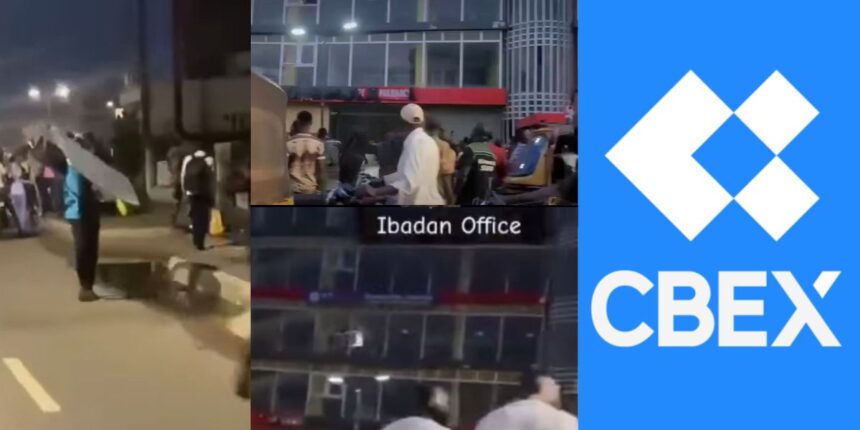From hope to despair, CBEX’s N1.3trn swindle leaves Nigerians broken with several investors taking to their respective social media accounts to lament the devastating blow a digital asset trading platform identified as CBEX had caused them.
Reports emerged that CBEX collapse has caused Nigerians to lose over N1.3 trillion ($833 million).
The CBEX’s N1.3trn swindle and the sudden crash of the trading platform reported on April 15, 2025, has become a major topic on social media, particularly X (formerly Twitter), where many Nigerians have expressed their outrage, despair, and emotional outpourings.
Also, reports have surfaced indicating a distressing scene at a CBEX office in Ibadan, Oyo State, where some investors took drastic measures in a bid to recover their funds lost to CBEX’s N1.3trn swindle.
It was reported that some individuals invaded the office and carted away items such as chairs, air conditioners, and even a solar panel.
A user (@alpontif) on X tweeted: “822 million Dollars. That’s how much CBEX moved into an ETH account and stole from Greedy Nigerians and other victims. That money will set up a Complete refinery that will cash out forever and return two or threefold within 5 years. But No, you people want fast money.”
Another user (@drpenking) said: “This guy lost 180k dollars on CBEX. Why do Nigerians Mumu like this? Even if you are too lazy to run a Business. You can build at least 10 three-bedroom flats spread across Nigeria with the amount and rent them out. You’d never be broke again forever.”
Investigation into CBEX’s N1.3trn swindle showed that the platform promised investors a staggering 100% return on investment (ROI) within 30 days.
It was gathered that CBEX gained the trust of some Nigerians under the guise that it is a secure and transparent avenue for wealth creation.
Operating primarily in US dollars, the platform lured thousands with the allure of quick riches, capitalizing on economic vulnerabilities and the growing interest in digital investments.
The cracks began to show in early April 2025 when CBEX restricted withdrawals, citing a “security breach.”
Investors on the platform were instructed to wait until April 15 for resolution, but scepticism grew as the platform demanded additional deposits, $100 for accounts under $1,000 and $200 for larger accounts, to “verify authenticity.”
This tactic was widely criticized as it mirrored the playbook of collapsing Ponzi schemes, where operators extract final funds before vanishing.
Analysing the crash on X space organised by Trending X, a cryptocurrency expert and security analyst, Taiwo Owolabi said data has shown that the money was moved to a TRX address (yourself:TDqSquXBgUCLYvYC4XZgrprLK589dkhSCf) and a total volume stolen so far in USDT is $847 million and likely to increase.
Owolabi stressed that the invested funds are gone because CBEX is not a licensed platform, and the creators designed a weak website to look like ByBit, which is a legitimate trading platform.
He stated: “They designed the weak website to convince people in the future that it was a security breach that affected them. Apparently, when you make payments, you pay them into a TRX account, and then, immediately, they move it from that TRX wallet, gather it, convert it to USDT, and then to ETH. So, when you are logging into your account, there is no money on your profile.
“What you see are just numbers. All the daily activities you do to ‘trade’ increase your money. All the AI trading is fake. When it’s time for withdrawal, they will send you another person’s money.
“Since you won’t be leaving them because of greed. You will most likely put the money back and even more. So, they will use that same money to pay another person. As you spread the word for them, more people will join and do the same.”
Pan-Atlantic Kompass reports that the CBEX’s N1.3trn swindle is not an isolated case but part of a troubling pattern.
Nigeria has a long history of Ponzi schemes exploiting economic hardship and financial illiteracy.
From the “wonder banks” of the 1980s and 1990s, such as Umana-Umana and Nospecto, to more recent scams like Twinkas, Racksterli, and MBA Forex, which defrauded investors of N213 billion between 2018 and 2021, these schemes thrive on promises of quick wealth.
While CBEX’s N1.3trn swindle appears to be Nigeria’s costliest scam yet, the Nigeria Deposit Insurance Corporation (NDIC) had estimated that Nigerians lost N911.45 billion to Ponzi schemes over 23 years, with N300 billion lost in the five years following MMM’s collapse.





